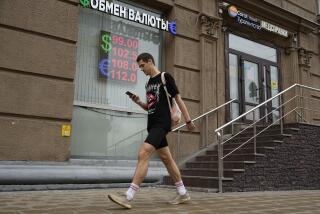Russians Not Happy in Cashless Society : Money: Some goods are in ample supply, but consumers cannot get funds from their accounts because of bank shortages.
- Share via
MOSCOW — In the central Russian city of Tver, clients who go to the bank these days to withdraw their money walk away crestfallen and empty-handed.
In the icy reaches of the northern Komi region, store shelves are laden with meat because residents cannot afford to buy it--their salaries have been directly deposited into their bank accounts, but the banks have no cash to give them.
Soviet consumers who thought they had been through it all, from the lack of basic medicines to long lines for bread, must now face a new shortage: cash. Just plain cash.
Warning of the potential for an even more severe shortage of ruble bank notes, the official Russian Information Agency reported that as of Monday, no bonuses and end-of-year extra salaries are to be paid out this year, making for a grim holiday season for all the Russian workers who depended on that extra cash to pay for their celebrations.
Russian Federation authorities, struggling to bring the imploding economy under control, say they had no choice. The national mint has simply been unable to keep up with galloping inflation and a money supply that will have nearly doubled, from about $230 billion to about $400 billion, in the course of this year.
“The situation with cash money is quite tough,” and the mint cannot physically handle the 400 billion bank notes a year now needed, said Yegor T. Gaidar, the Russian Federation deputy prime minister in charge of the economy. He also warned: “Disruptions (in cash payments) are quite possible. Temporary measures on limiting cash payments are also possible.”
That, to wary Russians who have already been through a pointless monetary reform this year that replaced old 50- and 100-ruble notes with new ones, implies that the government might take the Draconian step of freezing their bank accounts completely.
“Imagine!” said Zinaida Kucherskaya, manager of a branch of the Russian Savings Bank in central Moscow. “You come in for your own money and can’t get it!”
But Gaidar vowed that accounts would not be frozen, saying, “That would be worse than a crime, it would be a serious economic blunder.” He assailed weekend reports implying that a freeze was imminent, saying they “brought on a sharp crisis, because naturally people ran to grab their money from the savings banks.”
At Kucherskaya’s bank branch on Monday, clients said they were not especially concerned about a threatened cash shortage in the capital, mainly because they distrustfully keep most of their money out of the bank anyway. It has long been a habit among Soviet citizens who remember various government confiscations over the decades to keep much of their money in mattresses, books and other home hiding places. There it seems safer than in a state-owned banking system that pays almost no interest anyway.
“I always know that if I have to buy something, I have my money on my own,” truck driver Volodya Yershov said as he prepared a withdrawal form. “There’s nothing to buy anyway,” he added.
Kucherskaya said that she and her cashiers have gotten used to dealing with panics as rumors of impending monetary reform repeatedly sweep the city. When customers seem especially anxious, she said, “even though we don’t know everything, we talk to them and try to tell them to be calm.”
The Soviet minting agency, known as Goznak, is the most obvious cause of the cash shortage. Its directors have been complaining for months that the presses are running nonstop, turning out ruble bills, and it urgently needs millions of dollars in hard currency to pay for more of the special ink, paper and equipment it uses.
“You understand, it is impossible to quickly speed up the printing of paper money,” Gaidar said. But “this is a technical problem, not a financial one. The financial problem is much more complicated.”
The financial problem, said Misha Berger, an economics reporter for the daily Izvestia, is that while the money supply has doubled, pensions and workers’ salaries have largely tripled, and inflation is running at an estimated 450% per year. “The lack of bank notes isn’t the main problem,” he said. “The main problem is inflation.”
More to Read
Sign up for Essential California
The most important California stories and recommendations in your inbox every morning.
You may occasionally receive promotional content from the Los Angeles Times.










